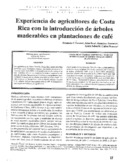Experiencia de agricultores de Costa Rica con la introducción de árboles maderables en plantaciones de café

View/
ISSN
1022-7482Date
1999Author
Tavares, Fernanda C.
Beer, John
Jiménez Otárola, Francisco
Schroth, Goetz
Fonseca, Carlos
Tavares, Fernanda C.
Type
Artículo
Metadata
Show full item recordAlternative title
Costa Rican farmers' experience with the introduction of timber trees in coffee plantations
Description
3 tab. 4 ref. Sum. (En, Es)
Abstract
Los agricultores de Pérez Zeledón, Costa Rica tienen una clara preferencia por Eucalyptus deglupta, Terminalia amazonia y T. ivorensis como maderables para sombra en sus plantaciones de café. Gmelina arborea se considera la especie maderable con más desventajas. Sus preferencias se basan principalmente en la facilidad de manejo de los árboles y sus efectos sobre el café. La reforestación con incentivos y con un fuerte enfoque forestal (1111 árboles ha-1) es inapropiado para el café, el componente más importante del sistema agroforestal.
The farmers of Péres Zeledón, Costa Rica have a clear preference for Eucalyptus deglupta, Terminalia amazonia and T ivorensis as timber producing shade trees in their coffee plantations. Gmelina arborea was identified as the timber shade tree with most disadvantages. The farmers preferences are based principally on ease of management of the trees and their effect on the coffee. Reforestation schemes using incentives, with a strong forestry emphasis (1,111 trees ha-1) are inadequate for coffee plantations, since coffee is the most important component of these agroforestry systems.
Keywords
Publisher
CATIE, Turrialba (Costa Rica)

